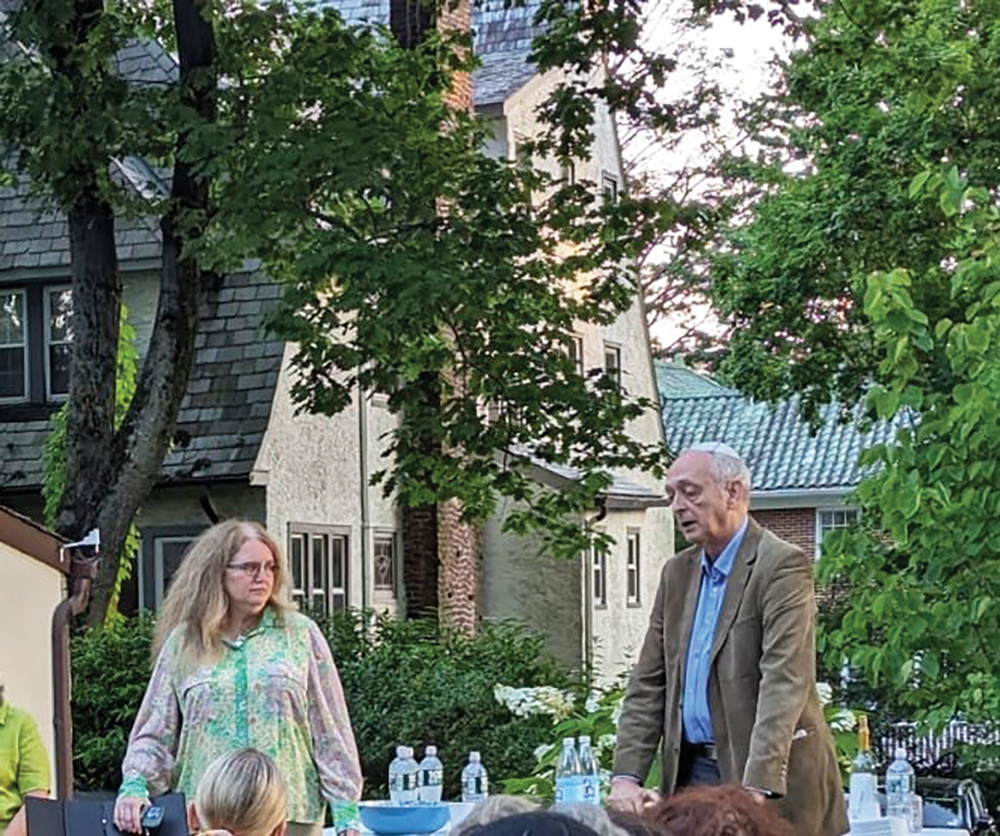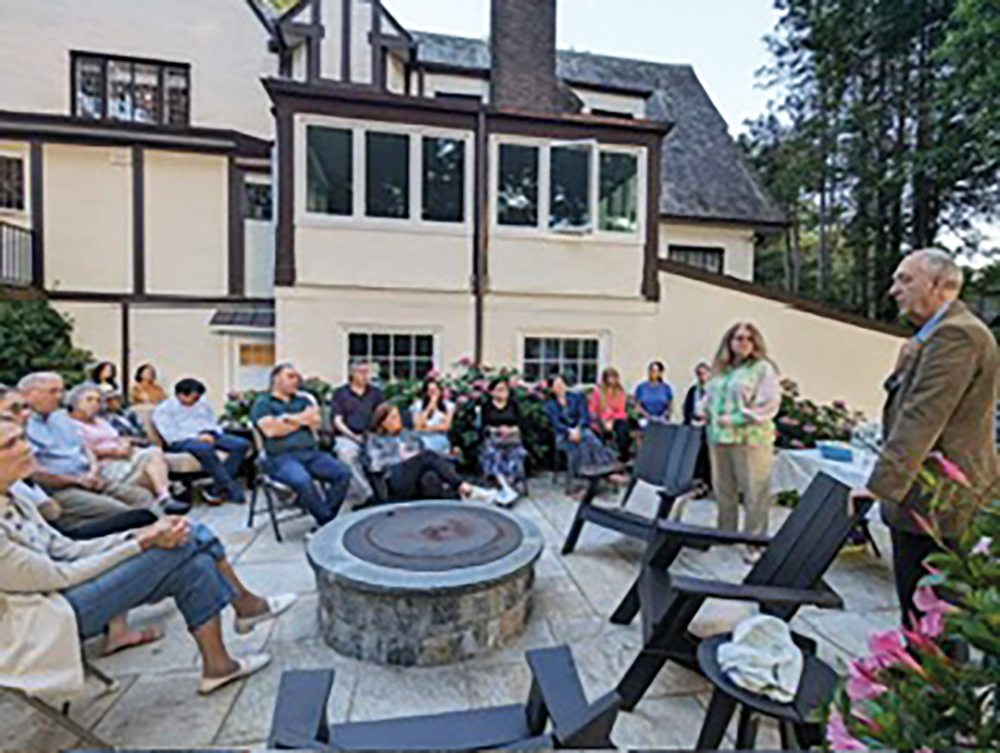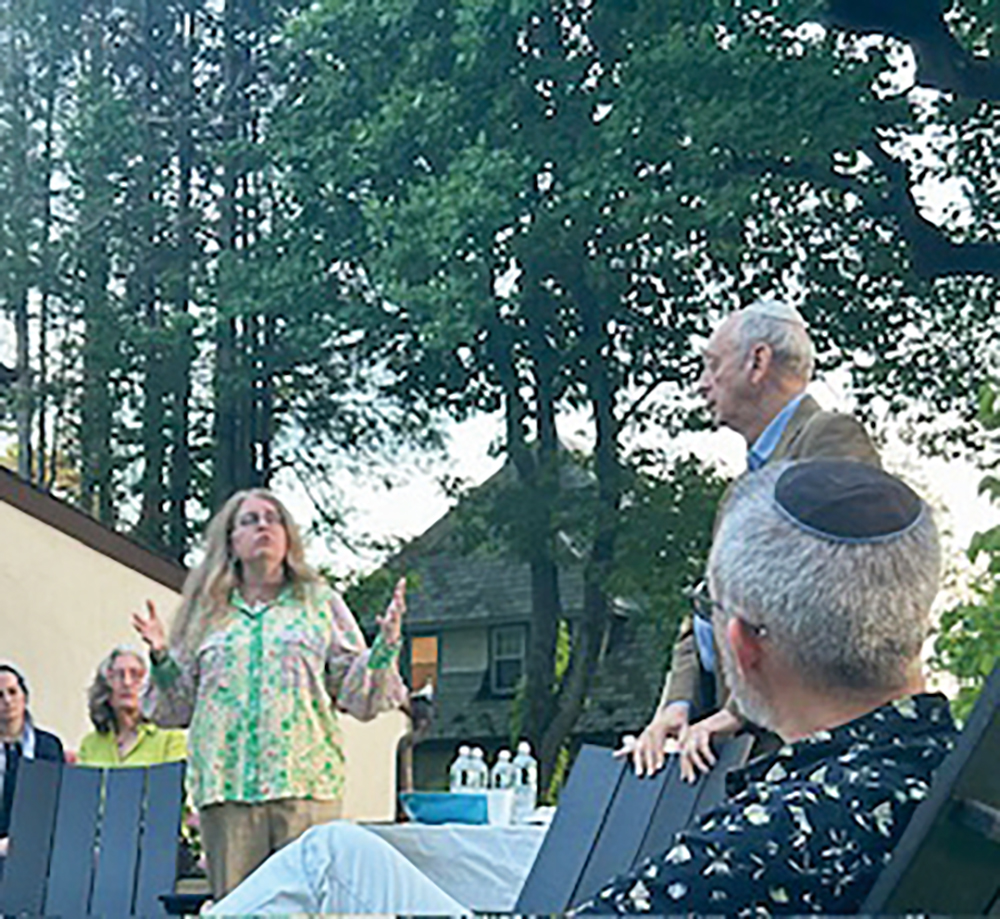
Last Sunday evening, at the home of Dawn and Steven Reich in New Rochelle, clinical psychologist Dr. Danny Brom spoke about trauma and resilience in Israel. An internationally renowned expert, Brom is the founding director of Metiv, a psychotrauma center in Israel; he has been treating traumatized Israelis for 40 years. He is also working in connection with Metiv’s program “Peace of Mind,” which works to help veteran combat soldiers process what they have been through.
Dr. Laurel Mayer, a resident of New Rochelle and professor of psychiatry at Columbia University Irving Medical Center, facilitated the event. She is one of the founding members of CopeColumbia, and specializes in issues of mental health.
“Life is challenging,” began Mayer. “There are a range of challenges and ways we respond to challenges. When does stress become distress? When does it become PTSD?”
Brom answered by discussing the concept of “survival mode.” He explained that survival mode is part of the nervous system that awakens in dangerous situations. “In a dangerous situation, you become very alert. You have to put your thoughts and feelings aside. You do what is necessary to get out of the danger. The big question is not how to get into survival mode. We don’t have to learn that—we have that. We got it from a higher power. But how do we get out of survival mode? When someone remains in survival mode, even after the situation is over, we call that PTSD.”

The Dutch-born expert went on to explain that the problem with psychiatric thought is that after being in combat, clinicians think that the soldiers who don’t suffer from PTSD are fine. But he explained that even those not suffering exactly from PTSD still suffer. “You can’t jump into a lake, swim to the other side and be dry afterwards. The majority of Israelis only partially get out of survival mode. The number of Israeli men who will never sit with their backs to the door is enormous, even though they don’t talk about it.”
In 2007, Metiv started the Peace of Mind program to help veteran combat soldiers. At the time, the army didn’t understand the need. Their response to hearing about the program was: “Why are you doing therapeutic activities for people who are not suffering?” But Metiv continued its therapeutic programs for teams of combat soldiers, funded solely by communities, and yielded strong results. The Ministry of Defense saw the results and now they co-fund the Peace of Mind program.
After this discussion, Mayer brought up the idea of resilience. “Israeli character is known for resilience. We understand resilience as meaning that you have a clear and realistic picture of the difficulties around you, but you have the sense that you will prevail, and make it through this challenge. This is the optimism of resilience. Is it inborn? Can it be taught?”
Brom answered, explaining that in his opinion, resilience has to do with processing what has happened. “You need to look back, and you might get overwhelmed, but you learn to regulate that, which means resilience can be taught.”
He shared that his team has done intervention in schools and has been training teachers to know what makes children resilient, and teaching them how to regulate themselves—even in early childhood. “The challenge at this moment, since October h, is that we all got into survival mode and it’s really hard to get out of it because the trauma is ongoing.”
Brom provided an example of a patient he had who had watched two of his best friends get killed. He went into a deep depression, and he wouldn’t come out of his depression because he felt that if he was OK, he would be betraying his friends. “There was a lot of guilt,” he said. “Feelings such as: They died—maybe I should have died. Could I have done something differently?” He explained that one of the greatest traumas for combat soldiers is seeing their friends die. “Death is contagious,” Brom said. “Seeing someone die makes people feel something die in themselves. So, we as therapists need to be totally present and listen to them. We have to ask them: ‘What did you see? What did you hear? What did it look like?’ After experiencing trauma, people need people—someone who can listen to you tell your story.”

Brom explained that one needs to find a therapist who can really be present for the patient, isn’t afraid to hear gory details, and can help the patient stop for a moment and regulate himself. “It’s so important for them to review what they went through,” he said. “There has to be a narrative without holes in it. When you have holes, and things you don’t remember, it keeps on bugging you. But when you remember your narrative and are able to communicate it, that helps the healing.”
Mayer asked Brom about new types of experimental therapeutic treatments, such as therapy with MDMA.
Brom shared that as a researcher, he has been looking for newer treatments, since many types of therapy don’t work for everyone. International research shows that only 35% of people who go into therapy with PTSD finish therapy without it. He is looking for a second line of therapy for those who are “treatment-resistant” to PTSD. One new alternative is MDMA assisted psychotherapy. MDMA is a form of the drug Ecstasy, and the U.S. has been developing a method of therapy using small doses. Brom explained that patients take MDMA in three of a 16-session program. “It changes their consciousness; they become much more mellow,” he said. But in Israel, one can only do these treatments in the framework of research because it has not yet been approved. The trial program is showing that in the chronic cases of people who do not succeed in regular therapy but then go to MDMA-assisted therapy, 69% are able to improve. “This is unheard-of success,” said Brom.
While he is in America, Brom shared, every morning when he wakes up, he dreads checking the news from Israel. But it gives him the conviction that he will have to do more. “We need more research, more therapists and more training. We have seen over 3,000 people training in therapy since October 7. It’s an enormous challenge, and that’s what gives my team meaning.”
For more information, please visit: metiv.org or https://metiv.org/en/peace-of-mind/












